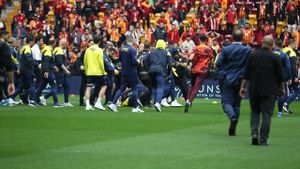Federal Liberal leadership candidates faced off on Monday evening during the French-language debate held at a studio in southwest Montreal. Candidates included Mark Carney, Chrystia Freeland, Karina Gould, and Frank Baylis, who discussed pivotal issues concerning Canada’s future.
The debate, moderated by former TVA-Quebec anchor Pierre Jobin, lasted from 8 p.m. to 10 p.m. and was characterized by lively exchanges on key topics such as economics, climate change, healthcare, and international relations.
Karina Gould, after the debate, remarked, “I’m the candidate for the future,” emphasizing her focus on progressive ideas aimed at revitalizing the party's image and engaging younger voters.
Following the debate, Freeland expressed the consensus among candidates, noting it was “a race inside the family” where they largely agree on various topics. During the event, candidates addressed the urgent matter of the Israel-Palestine conflict, with Gould advocating for peace and humanitarian aid, underscoring the importance of pursuing diplomatic solutions and emphasizing the need for a two-state solution.
The candidates also tackled Canada-U.S. relations, where Carney criticized the increasing aggression of Donald Trump. He stated, “Canada has to strengthen its economy to build up its negotiating position.” Gould added, “Americans need to understand they depend on Canadian resources,” signaling her commitment to protect Canadian interests against external pressures.
Each candidate delivered their opening remarks with focus on Canada's economy, the looming threats from the U.S., and maintaining national sovereignty. They responded to various structured questions, attempting to connect with voters who are concerned about domestic and international challenges.
On the subject of climate change, the candidates diverged on strategies but shared common concerns about the need for action. Gould highlighted her efforts against climate change, reassuring voters, “I won’t abandon the fight against it or concede on the carbon tax.” She articulated her resolve to halt any planned tax increases associated with climate action, framing it as part of her commitment to economic stability.
Regarding immigration, Gould pointed out the government’s ambitious targets and suggested dialogues with provinces and territories to realign expectations. “There’s too much ambition with immigration targets,” she stated, framing it within the broader challenges facing the housing market.
The debate also touched on various social issues including healthcare reform. Freeland proposed inviting Canadian physicians working abroad back home to bolster the healthcare system, emphasizing the need to maximize existing talents and resources for the benefit of all Canadians. Carney echoed her sentiments, stressing the elimination of bureaucratic hurdles preventing healthcare professionals from serving efficiently.
Overall, the candidates' performances highlighted their perspectives on enhancing Canada’s standing, both domestically and on the global stage. Integration of their solutions to complex issues like energy, security, and economic growth will be pivotal as they seek to expand the Liberal Party’s base and prepare for upcoming electoral challenges.
Following the debate, many voters were left contemplating the presented visions, particularly with tensions brewing from U.S. politics and pressing issues like climate change and healthcare dominating citizen concerns. The importance of clear, cohesive leadership amid such challenging dynamics could very well determine the future success of the Liberal party.



